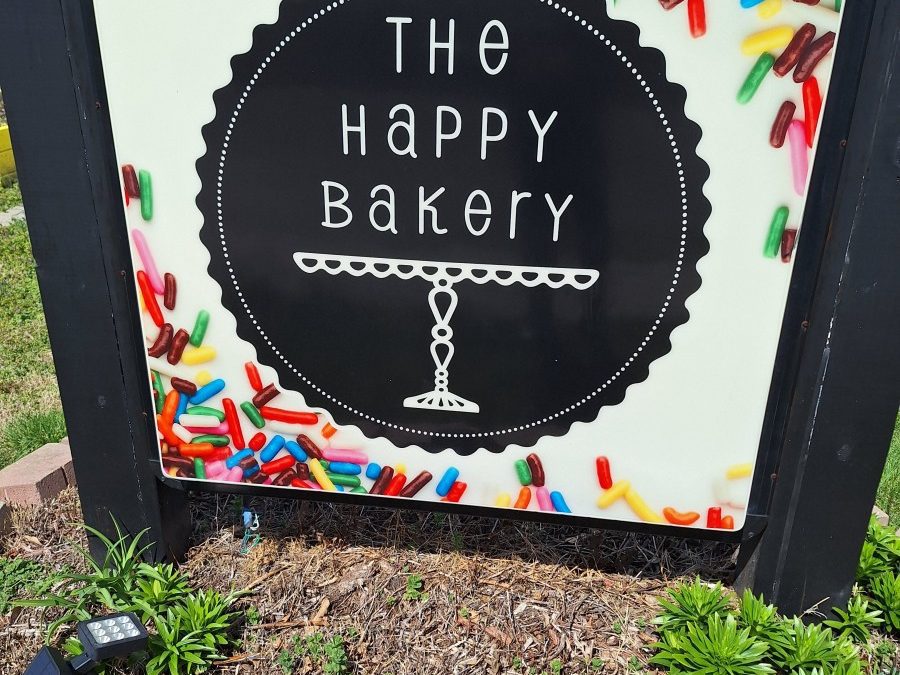Join the journey of a bakery transforming vegan dining with passion and quality.
In a cozy corner of our town lies a treasure that’s become a beacon of joy and warmth for many: The Happy Bakery. Owned by the spirited Charlie Cook, this place is more than just a bakery—it’s a story of transformation, resilience, and the magic of following one’s heart.
Today, I’m thrilled to share with you the journey of Charlie and her delightful establishment, a tale that might just make you crave a visit.
With her infectious enthusiasm, Charlie recalled The Happy Bakery’s inception. It began as a simple bakery, famed for its daily baked goods and a singular savory special. However, fate had grander plans.

When the pandemic gripped the world, Charlie faced the daunting challenge of keeping her dream alive. The solution? A pivot that would redefine the bakery’s identity. Inspired by a homemade mushroom melt, crafted out of necessity when a local restaurant ran out of veggie burgers, The Happy Bakery embarked on a culinary adventure.
This dish, lovingly named Michael’s OG Mushroom Melt after Charlie’s husband, became the cornerstone of a new, vibrant menu. What started as an endeavor to survive the lockdown blossomed into a full-fledged vegan eatery, thriving against the odds and capturing the hearts of the community.
But this story of transformation doesn’t stop with the menu’s expansion. I asked Charlie about her journey towards veganism, intrigued by how a bakery renowned for its conventional treats transitioned to a haven for plant-based delicacies.
Family embraced veganism
Charlie shared that in 2016, she and her family embraced veganism, a decision that deeply resonated with their personal ethics. It was a pivotal moment, compelling them to align their business with their newfound beliefs.
Transitioning The Happy Bakery to a vegan establishment was a venture filled with trial and error, as Charlie experimented to create the perfect cake and cookie recipes that would eventually define her vegan repertoire.
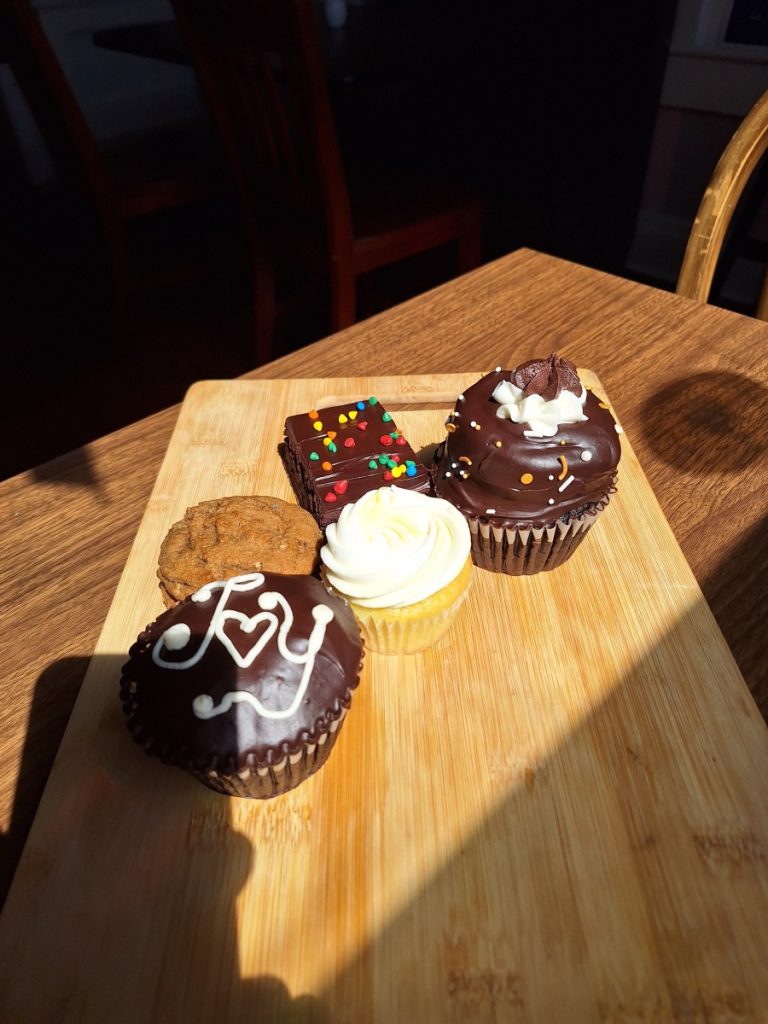
This commitment to veganism and the art of baking without animal products was not just about adapting to a lifestyle change; it was about creating a space where ethics and enjoyment converge.
With every new recipe and each dish added to the menu, The Happy Bakery evolved into a community cornerstone, embodying the spirit of innovation and the joy of shared ethical consumption.
As Charlie and I talked she took us deeper into the heart of what makes The Happy Bakery such a unique and cherished spot in O’Fallon. The mission was clear: to bring homemade, plant-based delights to a town where such options were scarce. Charlie, with a spark of excitement in her eyes, shared the passion that drove the expansion of her menu.
Charlie saw an opportunity to revolutionize the local dining scene in a place like O’Fallon, where vegan options were few and far between. She observed, “It’s hard to find a veggie burger that doesn’t just come frozen in a box here.”
This realization fueled her determination to offer something different, something authentic. At The Happy Bakery, the veggie burgers are a labor of love, crafted by hand and bursting with fresh vegetables, a stark contrast to the frozen alternatives that populate local menus.
Beyond just burgers
But Charlie’s vision extended beyond just burgers. She aimed to transform the landscape of comfort food in her community, making vegan macaroni and cheese and soups free of animal products, and dishes traditionally laden with dairy and meat.
Her approach was simple yet revolutionary: take the familiar—those classic dishes that evoke nostalgia and comfort—and recreate them for a vegan palate without compromising taste or warmth.
Through Charlie’s innovative spirit, The Happy Bakery has become a sanctuary for those seeking comfort food without the guilt. She’s not just catering to vegans; she’s opening a door for everyone to explore plant-based eating in a new and exciting way. “One of the things that I get excited about,” Charlie said, “is making these familiar dishes accessible to people who might not normally seek them out.”
This commitment to inclusivity and innovation is what sets The Happy Bakery apart. It’s a place where everyone, regardless of their dietary choices, can come together to enjoy a meal that’s both comforting and conscious. It’s a testament to Charlie’s belief that good food, crafted with care and compassion, can bring people together and perhaps even change a few minds along the way.
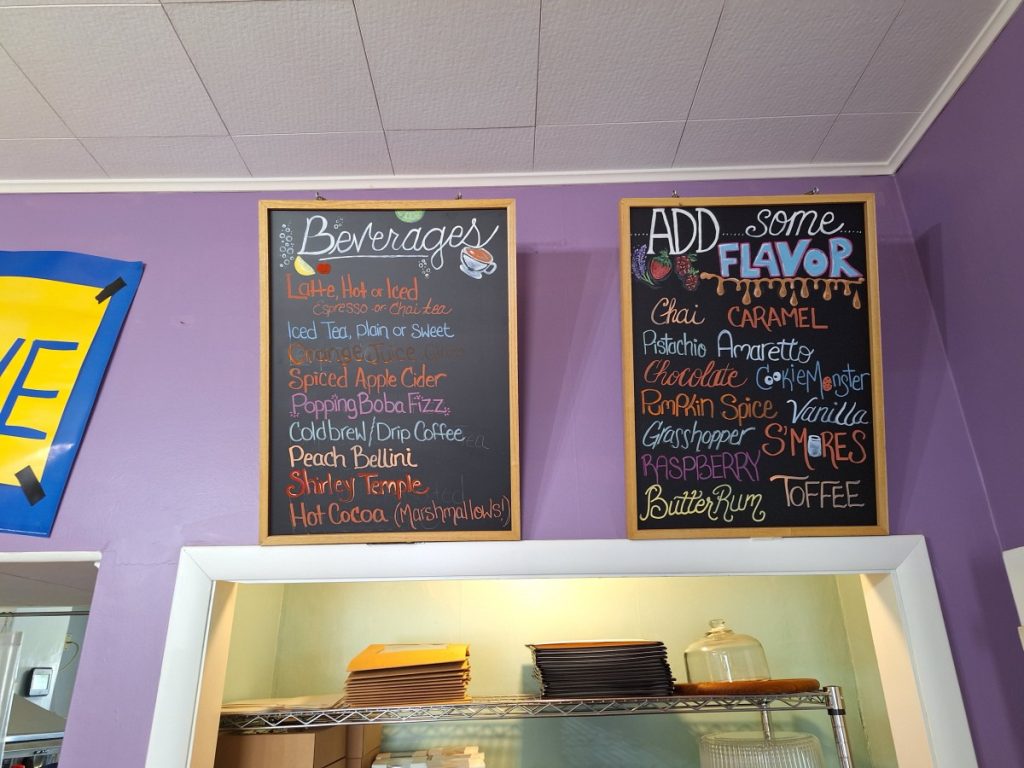
When I came to The Happy Bakery for a Chamber of Commerce event, I was skeptical, yet intrigued by the menu choices. I ventured into the world of vegan dining without much expectation. The menu item that caught my eye? The fried chicken sandwich sounded like my best option.
Charlie, ever the gracious host, smiled knowingly as she shared her insights on the subject. “There are a lot of things we serve that people wouldn’t immediately identify as vegan,” she confessed.
This statement rang true in my own experience, as the fried chicken sandwich I tasted was unlike any vegan dish I had expected. It was a delightful surprise, an echo of traditional flavors without any animal products.
Charlie continued, addressing the broader evolution of vegan cuisine. “It’s come such a far way in the last 5-10 years,” she noted, highlighting the advancements in plant-based cooking. Her menu, rich with innovative dishes, stands as a testament to this progress.
While some items like the veggie burger proudly wear their vegan badge, many others, like the fried chicken sandwich, are crafted to appeal to a wider audience, challenging preconceived notions and inviting all to savor the richness of vegan cuisine.
Invitation to skeptics and traditionalists
This revelation at The Happy Bakery serves as a gentle invitation to skeptics and traditionalists alike, offering a bridge between familiar comfort foods and the burgeoning world of plant-based eating.
Charlie’s mission extends beyond serving food; it’s about opening minds and palates to the possibilities of veganism without sacrifice.
With a gleam in her eye, Charlie shared, “Oh, our buffalo chicken Mac and cheese is definitely a top seller.” She painted a mouthwatering picture: a dish combining the creamy, homemade embrace of macaroni cheese with the zesty kick of buffalo sauce, topped with crispy fried ‘chicken’, jalapenos, and onions.
It’s a symphony of flavors, crowned with their house ranch, a dish that epitomizes comfort food at its finest. This isn’t just food; it’s an experience, a culinary hug that promises warmth and satisfaction in every spoonful.

Charlie recounted the story of their beloved falafel, a naturally vegan item that held its ground as a fan favorite for years. Charlie’s description evoked a sense of nostalgia and culinary delight.
“Falafel is like a chickpea hush puppy,” she explained, painting a picture of a fried, savory treat, traditionally served wrapped in a warm embrace of tortilla or pita, accompanied by a rich blend of hummus, ranch, and fresh veggies.
Despite its departure from the menu, the falafel left a lasting impression, a reminder of the bakery’s diverse and inclusive culinary spirit.
Yet, as times changed and the bakery faced the practical challenges of finance and space, decisions had to be made. The falafel, despite its popularity, had to say goodbye, a reminder that the menu, like life, is always in flux, adapting to new circumstances and needs.
Another layer
This latest revelation adds another layer to our understanding of The Happy Bakery. It’s not just a place of food; it’s a space of memories, choices, and the constant pursuit of balance between tradition and innovation.
Charlie’s stories and dishes invite patrons into a world where vegan food isn’t just about ethics or health but about pleasure, comfort, and the joy of shared experiences.
But as with any great story, as one chapter ends, another begins. Charlie’s enthusiasm was palpable as she described the current stars of the menu. The buffalo chicken Mac and cheese continues to reign supreme, a testament to the bakery’s ability to turn classic comfort foods into vegan masterpieces.
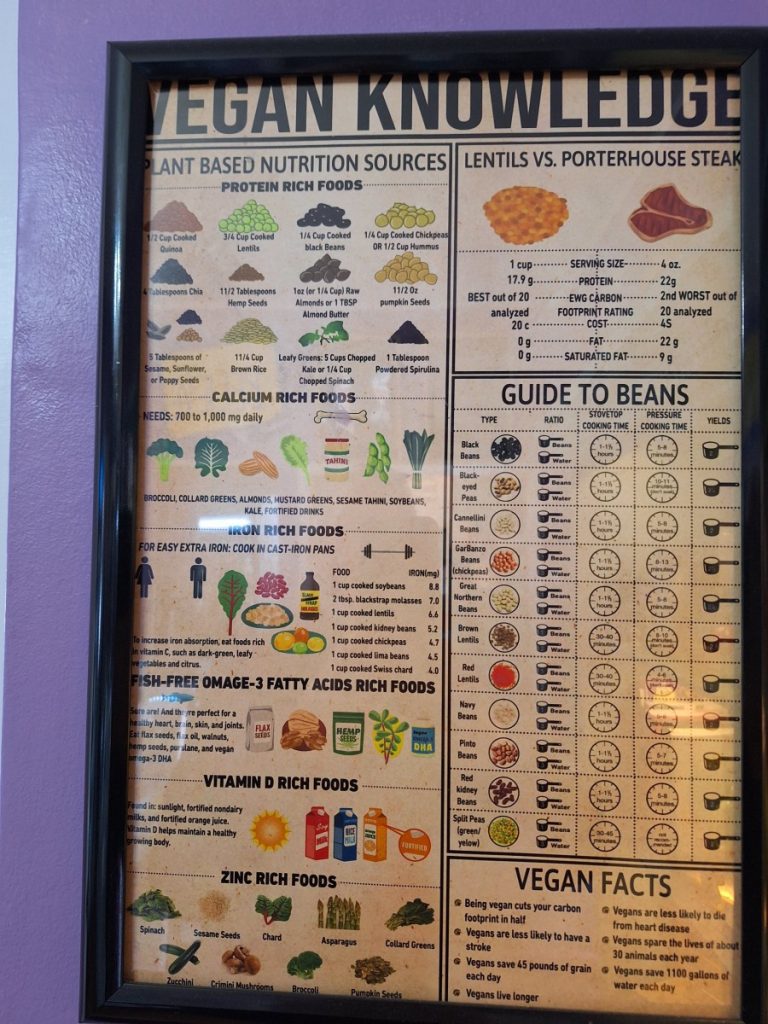
The Mac and cheese, in all its creamy glory, and the versatile fried chicken sandwich, available in three distinct variations, stand as pillars of the bakery’s success, blending the familiar with the innovative.
And then there’s brunch—a weekend celebration that draws crowds with the promise of fluffy pancakes, golden waffles, and the iconic chicken and waffles.
Charlie’s personal favorite, the chicken and waffles, encapsulates the essence of The Happy Bakery’s brunch: a perfect balance of sweetness and savoriness, a dish that defies expectations and invites diners to indulge in the joy of weekend leisure.
Charlie’s philosophy is all about redefining and challenging the traditional notions of vegan food. She thrives on the challenge presented by skeptics and the curious alike, those who wonder how their favorite dishes could ever be “veganized.”
Transform classic, animal-centric dishes
Her goal? To transform classic, animal-centric dishes into plant-based delights without losing the essence of what makes them comfort food. “It’s about making something hearty, yummy, and appealing,” Charlie explained, her passion evident in every word.
This drive leads her to create dishes that not only satisfy the taste buds but also open minds. For Charlie, vegan food is not a restriction but an invitation—an invitation to explore, taste, and enjoy without preconceptions. She tackles the misconceptions head-on, transforming doubt into delight, and skepticism into satisfaction.
The example of her dynamite Alfredo sauce illustrates this perfectly. It’s not merely a substitute; it’s a stand-alone triumph, a testament to the idea that vegan food can be just as rich, creamy, and comforting as its traditional counterparts.
Through dishes like this, Charlie isn’t just serving food; she’s serving experiences, challenging diners to reconsider what vegan food can be.

I couldn’t help but think about my mission work, where plant-based diets are more prevalent due to cultural and economic factors, Charlie offered a candid insight into the paradox of food pricing in America.
“It’s expensive everywhere else,” she noted, referring to meat, which in many parts of the world is considered a luxury rather than a staple. This contrast sheds light on a larger, systemic issue—how heavy subsidies and factory farming in the U.S. have distorted the true cost of meat, making it artificially cheap and overshadowing the value of plant-based foods.
Charlie’s perspective is not just a critique but a call to awareness and change. “It should be expensive,” she remarked about meat, pointing out the environmental and ethical costs that are often overlooked.
Significant cultural and economic disparity
Her commentary strikes at the heart of a significant cultural and economic disparity, highlighting the irony that, in a country where meat is subsidized, plant-based food often comes with a higher price tag, despite its lower environmental impact. This, Charlie believes, is a sad reflection of our priorities.
Yet, in this challenge, Charlie sees an opportunity—an opportunity to educate, to inspire, and to offer alternatives.
The Happy Bakery becomes more than just a place to eat; it’s a space for conversation and reflection, a venue where delicious food serves as an entry point to larger discussions about health, sustainability, and global food justice.
“The biggest challenge,” Charlie admitted, “is people’s perceptions.” She shared the all-too-common scene: individuals walking through her doors burdened with preconceived notions, their taste buds shadowed by skepticism. It’s a barrier not of flavor or quality but of mindset, a wall built from years of culinary tradition and misunderstanding.
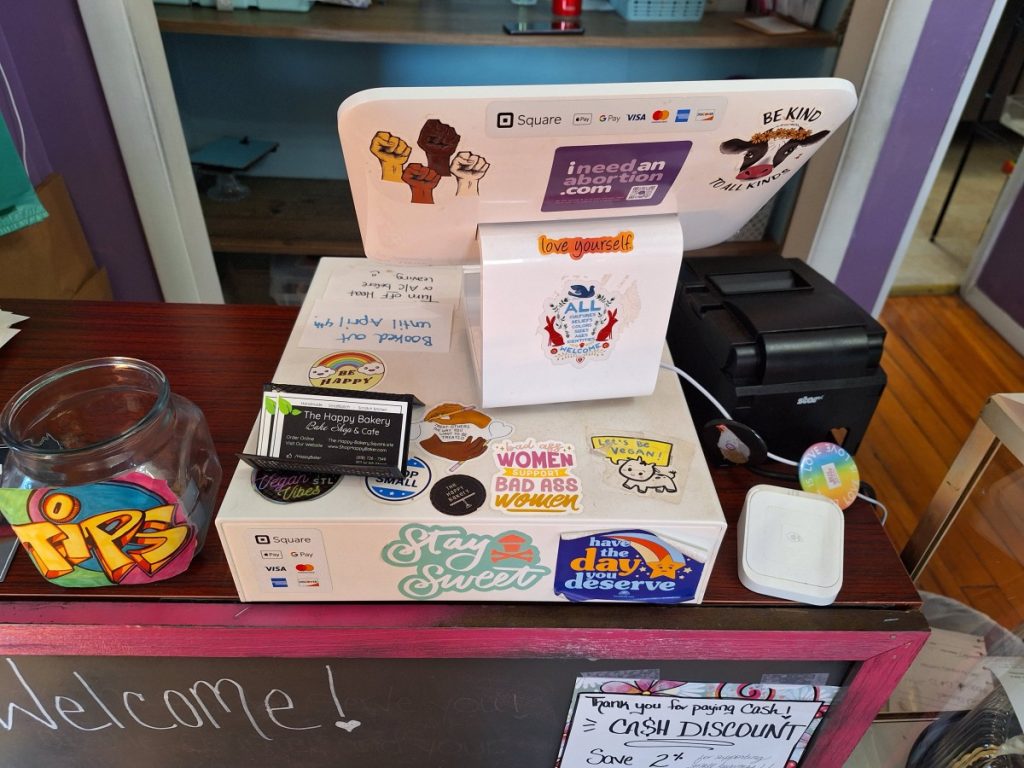
Charlie’s approach to this challenge is as nurturing as her food. She doesn’t aim to confront or convert but to invite and intrigue. The Happy Bakery, after all, is an award-winning establishment, recognition that speaks volumes about the quality and appeal of its offerings.
Yet, the accolade that Charlie seems most proud of is the transformation of a diner’s skepticism into curiosity, and ultimately, satisfaction.
This journey of changing perceptions is not just about introducing patrons to veganism; it’s about enriching the dining experience, about challenging diners to step beyond their culinary comfort zones. Charlie has faced a few dishes she couldn’t veganize to her satisfaction, showcasing her skill and creativity.
Yet, her most significant accomplishments occur outside the kitchen, in the moments when a new customer decides to take that first tentative bite and finds themselves pleasantly surprised.
Microcosm of a broader cultural shift
In this light, The Happy Bakery serves as a microcosm of a broader cultural shift, a place where biases can be gently dismantled, one dish at a time. It’s an environment where skepticism can turn into surprise, and surprise can blossom into enjoyment, all within a few bites.
The topic shifted towards the sourcing of ingredients, a subject vital to any culinary establishment, yet uniquely challenging for those committed to plant-based cuisine, especially in regions like the Midwest. Charlie, ever pragmatic and transparent, shared her perspective on local sourcing with refreshing honesty.
“It isn’t the main focus,” she admitted, revealing a nuanced stance on the matter. While Charlie cherishes the ideal of supporting local agriculture, she faces the reality of the Midwest’s short growing season and the limited availability of local vegan produce.
However, she harbors a special relationship with the produce market next door, seizing every opportunity to incorporate their offerings into her kitchen, albeit acknowledging that much of this produce isn’t local due to geographical constraints.

Yet, this doesn’t deter Charlie from embracing the local spirit in other, meaningful ways. She illuminated the intricate balance between idealism and practicality in running a small vegan eatery. “We grow a lot of our herbs and spices,” she shared, offering a glimpse into the personal touch that defines The Happy Bakery.
Their commitment to cultivating an extensive garden and using homegrown tomatoes, basil, onions, and herbs whenever possible is a testament to their dedication to freshness and quality, even within the limited Midwestern growing seasons.
But Charlie’s local impact extends beyond the confines of her garden and the dishes she serves. Understanding the financial realities small businesses face, she chooses a different, perhaps even more impactful path of community engagement.
Instead of insisting on locally sourced ingredients, which might not always be practical or affordable, The Happy Bakery invests in the community’s fabric.
Bakery’s involvement in local events
Charlie’s narrative took an inspiring turn as she outlined the bakery’s involvement in local events and causes—from catering for the high school’s Les Misérables show to supporting teacher programs and contributing to waste management initiatives.
This approach reflects a profound commitment not merely to the concept of ‘local’ as a source of ingredients but as a community to nurture and uplift.
Charlie’s affirmation was clear and unequivocal: “Absolutely everything on our menu is entirely dairy-free.” But her commitment goes beyond merely avoiding dairy. The bakery’s menu is a sanctuary free from all animal products—no dairy, eggs, meat, or any byproducts.
Charlie educates and enlightens as she explains the breadth of what ‘animal-free’ truly means, extending to ingredients like gelatin, honey, and carmine—a coloring agent derived from beetles, a fact that often goes unnoticed by the average consumer.
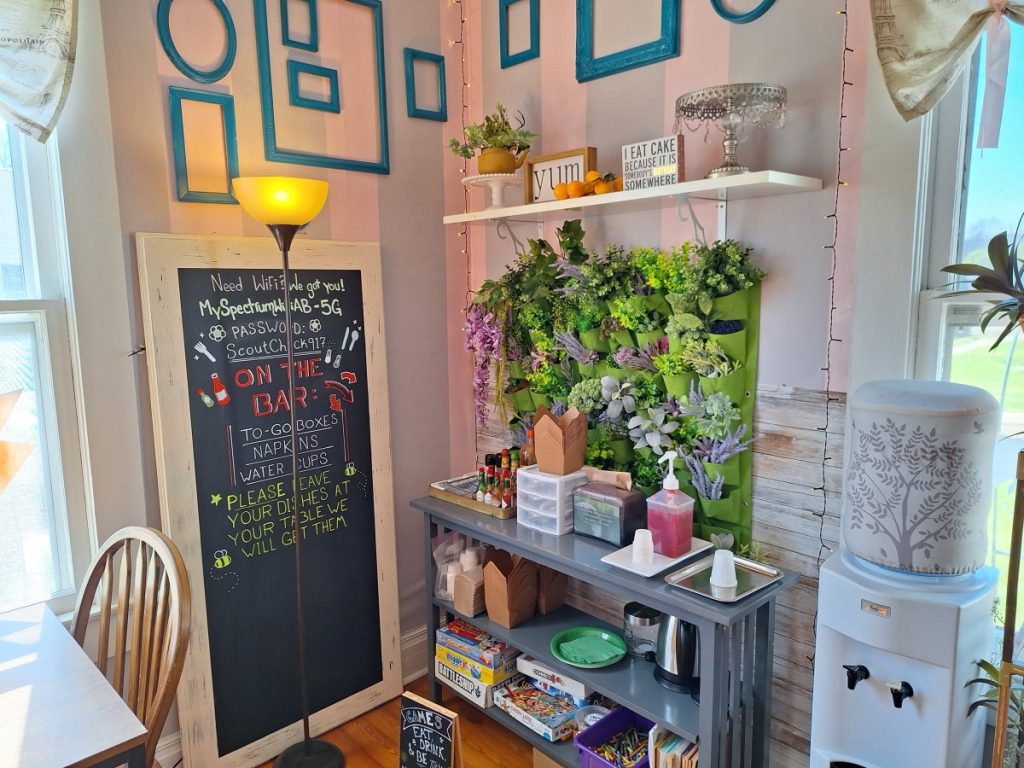
This revelation about carmine serves as a stark reminder of the hidden animal products in many foods, emphasizing the care and ethical diligence that The Happy Bakery employs in crafting its menu. It’s not just about removing animal products; it’s about creating a space where everyone, regardless of dietary preferences or ethical convictions, can dine with peace of mind.
Charlie’s declaration, “I don’t think we’re ever going to go back to a dairy format,” is more than a business decision—it’s a moral stance, a reflection of a broader vision that champions animal welfare, environmental sustainability, and human health.
In the continuing exploration of The Happy Bakery’s ethos and menu, a seemingly simple question about cheese unveils a profound narrative about dietary choices, cultural sensitivity, and innovation within the vegan industry. Charlie’s response to the query about cheese and its traditional dairy base leads us to the heart of what makes plant-based dining both a challenge and a revelation.
The common misconception
Charlie clarified the common misconception: “Regular cheese is, yes, but vegan cheese is not.” She highlighted the evolution of vegan cheese, now crafted from alternatives like coconut or soy, which has significantly changed over the past 15 years.
This shift isn’t just about dietary preferences; it’s deeply rooted in environmental concerns, health issues, and cultural sensitivities. As Charlie pointed out, the rise in allergies and intolerances to dairy products, compounded by the adverse effects of factory farming and pollution, has fueled the dairy-free industry’s growth.
But Charlie’s insights extend beyond the technical aspects of vegan cheese production. She delves into the cultural and genetic predispositions to dairy intolerance among various populations, including African American, Indian, and Hispanic communities.
This isn’t merely a matter of choice; for many, it’s a necessary adaptation for health and comfort. The unfortunate discrepancy in school systems, where lactose-intolerant children are still served dairy milk, underscores the broader societal need for accessible, dairy-free alternatives.
The transformation of vegan cheese from a “plasticky and thick” substitute to a product nearly indistinguishable from traditional cheese represents a significant cultural shift.
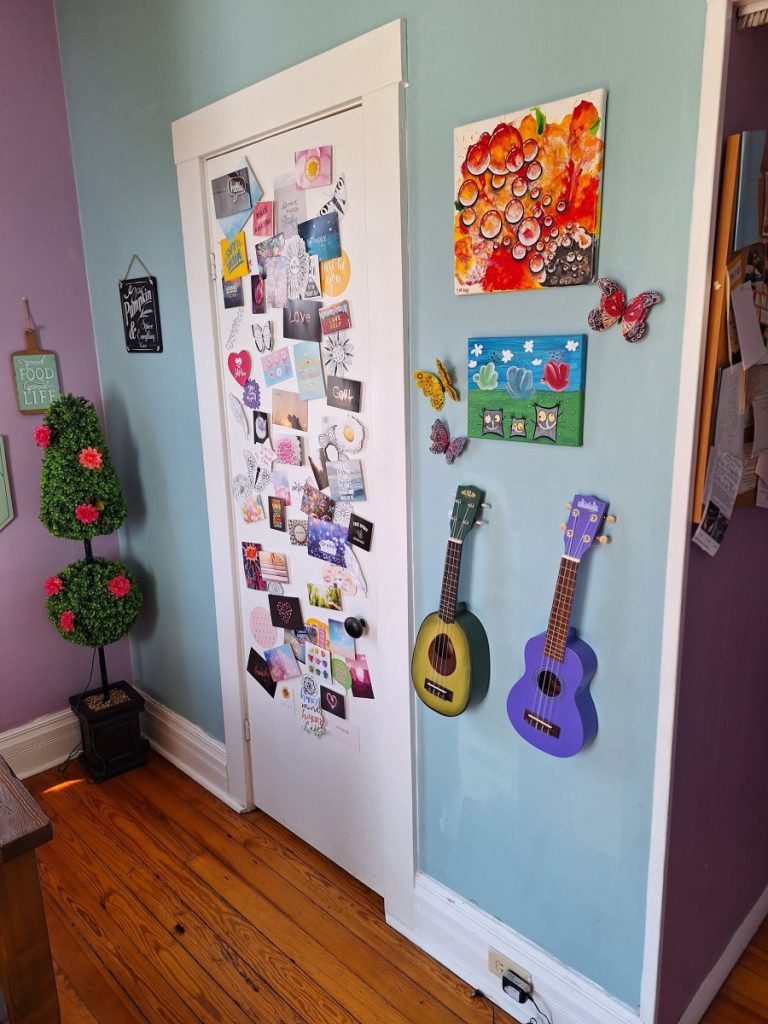
This advancement reflects not just a change in consumer tastes but a growing recognition of dietary diversity and health-consciousness across communities. Charlie celebrates this progress, noting how mainstream restaurants are beginning to embrace dairy-free options in response to increasing demand.
However, Charlie’s mission goes beyond merely offering these alternatives. She aims to reshape the conversation around vegan products, challenging derogatory labels like “fake cheese” or “fake meat.”
Her approach is thoughtful and intentional, advocating for terms that respect the legitimacy and value of plant-based options. By changing the language, Charlie seeks to alter perceptions, making vegan choices more appealing and acceptable to a broader audience.
Charlie acknowledges the challenges inherent in running a vegan establishment, especially in today’s economy. She describes the meticulous process of setting prices, from conducting market research to comparing with local competitors.
Unwavering commitment to quality
The reality she paints is one of careful consideration and unwavering commitment to quality. Unlike many establishments that might rely on pre-made, frozen goods, The Happy Bakery insists on handcrafting the majority of its offerings—from the macaroni and cheese to the burgers and soups.
This dedication to homemade cuisine naturally influences the price point. Charlie transparently addresses the feedback received in reviews regarding their prices.
She explains the inevitable cost implications of choosing to prepare food from scratch, emphasizing the time and labor invested in each dish. “Time is more expensive than ingredients generally,” she notes, highlighting a universal truth in the culinary world.
Beyond the cost of ingredients and preparation, Charlie delves into the ethical considerations underpinning her business model, particularly regarding her staff.
Maintaining an ethical wage, especially during challenging times such as the COVID-19 pandemic, is a priority that, while impacting prices, reflects the bakery’s commitment to its employees’ well-being. This approach supports the staff and ensures the continuity and quality of the food served.

Comparing her prices with those of mainstream restaurants offering vegan options, Charlie makes a compelling case. She points out that while some establishments may charge similar prices for vegan dishes, they often rely on cheaper, pre-made products. In contrast, The Happy Bakery’s higher price point is a direct investment in the quality of food and the fair treatment of staff.
Through this dialogue, Charlie challenges the narrative that vegan dining is prohibitively expensive, framing it instead as a reflection of value—where the cost encompasses not just the meal but the ethical and sustainable practices behind it.
The Happy Bakery, thus, stands as more than just a dining venue; it’s an embodiment of principled business practice, where every dollar spent supports a commitment to quality, community, and ethical employment.
Peer into the future
As we peer into the future through Charlie’s eyes, the narrative of The Happy Bakery takes on a tone of reflective honesty and hopeful aspiration. Charlie shares her candid thoughts on the bakery’s trajectory, revealing the harsh realities of running a small business in today’s economic landscape, especially in a community like O’Fallon.
Despite the bakery’s success, the continual battle with rising expenses and the overwhelming nature of taxes, fees, and overheads paints a picture many small business owners can relate to. The love and dedication poured into The Happy Bakery are palpable in Charlie’s words, as is the frustration of seeing a dream constantly challenged by external pressures.
Her mention of a five-year exit strategy isn’t just a business decision; it’s a heart-wrenching acknowledgment of the potential end of a significant chapter in her life.
Yet, even in the face of such uncertainty, Charlie’s spirit and love for her bakery shine brightly. Her hopes for the future are intertwined with a deep desire to remain an integral part of the community.
The dream isn’t about massive expansion or financial conquest; it’s about sustainability, visibility, and deeper community integration. Charlie yearns for The Happy Bakery to be recognized and appreciated by the people of O’Fallon, for it to be a name that resonates in homes and is suggested in conversations as a go-to spot for quality vegan fare and delectable treats.
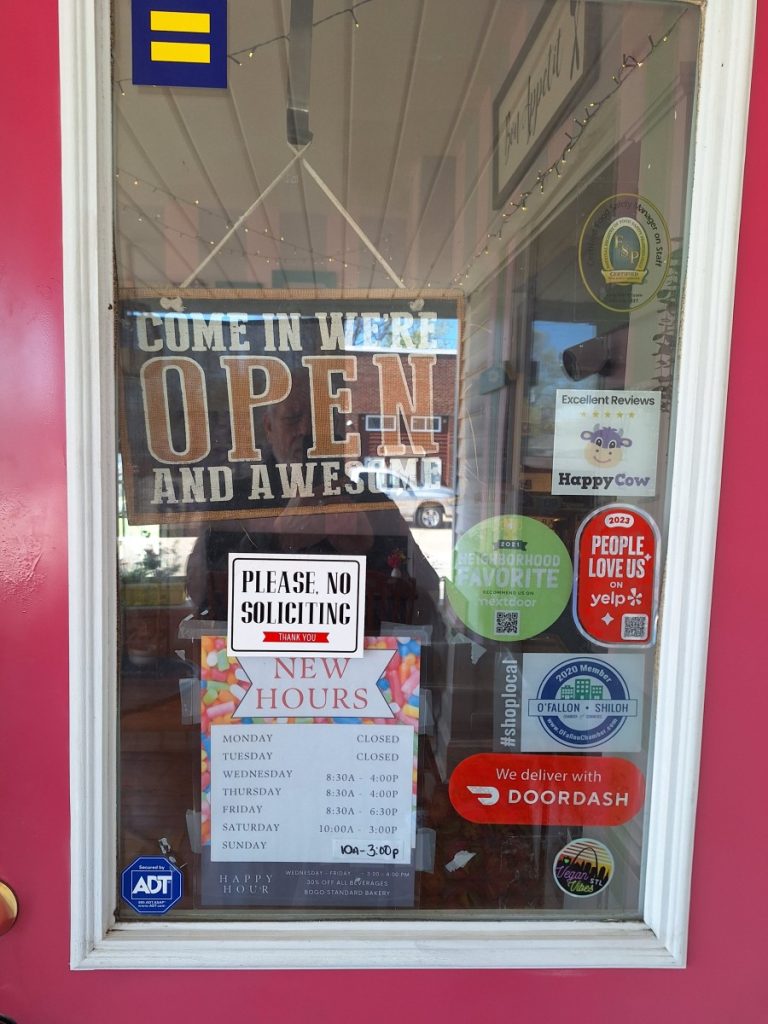
Her aspirations extend beyond mere business growth; they reflect a passion for her craft and a commitment to the community that has been her bakery’s home for eight years. Charlie envisions a future where The Happy Bakery is not just a place people stumble upon but a cherished local staple, known and loved by all.
What’s the final chapter in our journey with Charlie and The Happy Bakery? I’m here to bring our story to a close.
Charlie wants to clarify a significant misunderstanding stemming from their initial coverage in the local press. The Happy Bakery, while offering vegan and gluten-free options, is not the spartan health food store some might assume it to be.
The joy of plant-based eating
Instead, it celebrates the joy of plant-based eating without sacrificing the indulgence and satisfaction traditionally associated with good food. “Our food still has lots of butter and lots of cheese,” Charlie emphasizes, pointing out that while their offerings are plant-based and cholesterol-free, they’re designed to delight rather than diet.
But beyond the misconceptions and challenges, Charlie’s reflections reveal a deeper, more poignant narrative—one of community, continuity, and love. The Happy Bakery is woven into the fabric of its customers’ lives, marking milestones from birthdays to weddings to first birthdays, creating a unique, enduring bond between the baker and the community she serves.
This relationship, built over cakes and celebrations, underscores the special place The Happy Bakery holds in the hearts of its patrons. Despite the economic hardships and the ever-looming possibility of closure, the bakery stands as a testament to the strength and support of the O’Fallon community.
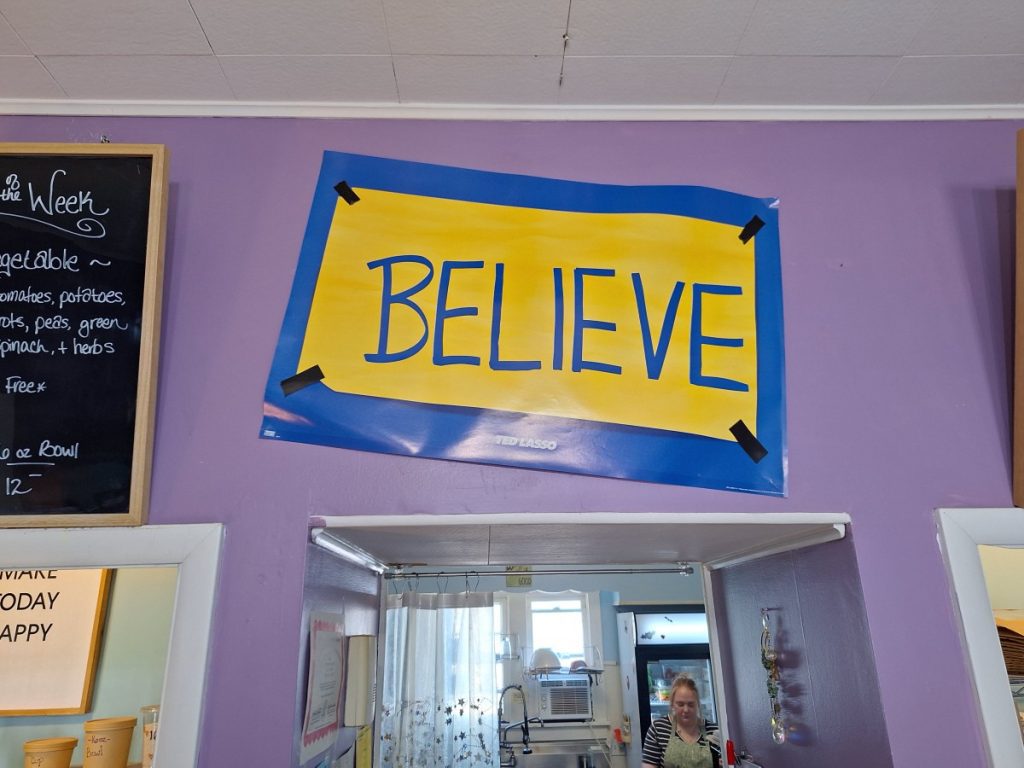
It’s a sanctuary not just for those seeking plant-based treats but for anyone looking to celebrate life’s special moments with sincerity and sweetness.
Charlie’s gratitude for her customers, her staff, and the journey they’ve shared shines through as a beacon of hope and resilience.
It’s a reminder that small businesses like The Happy Bakery are more than just eateries or shops; they are vital parts of their communities, offering spaces for joy, connection, and growth.
So, as we conclude our story, we’re reminded of the impact of supporting local businesses like Charlie’s, and of the difference we can make with our choices and loyalty. The Happy Bakery, with all its challenges and joys, stands as a symbol of what can be achieved when passion, quality, and community come together.
Closing
We hope you are enjoying these articles and are willing to continue to follow along as we share our adventures of learning about life in southern Illinois, This is an exciting area and we are so happy to be part of this area. Our lives are being fulfilled by the people we are meeting. Bruce & Karen.
This website is a participant in the Amazon Services LLC Associates Program, an affiliate advertising program designed to provide a means for sites to earn advertising fees by advertising and linking to Amazon.com and affiliated sites. As an Amazon Associate, I earn from qualifying purchases.
Enjoy the extra pictures

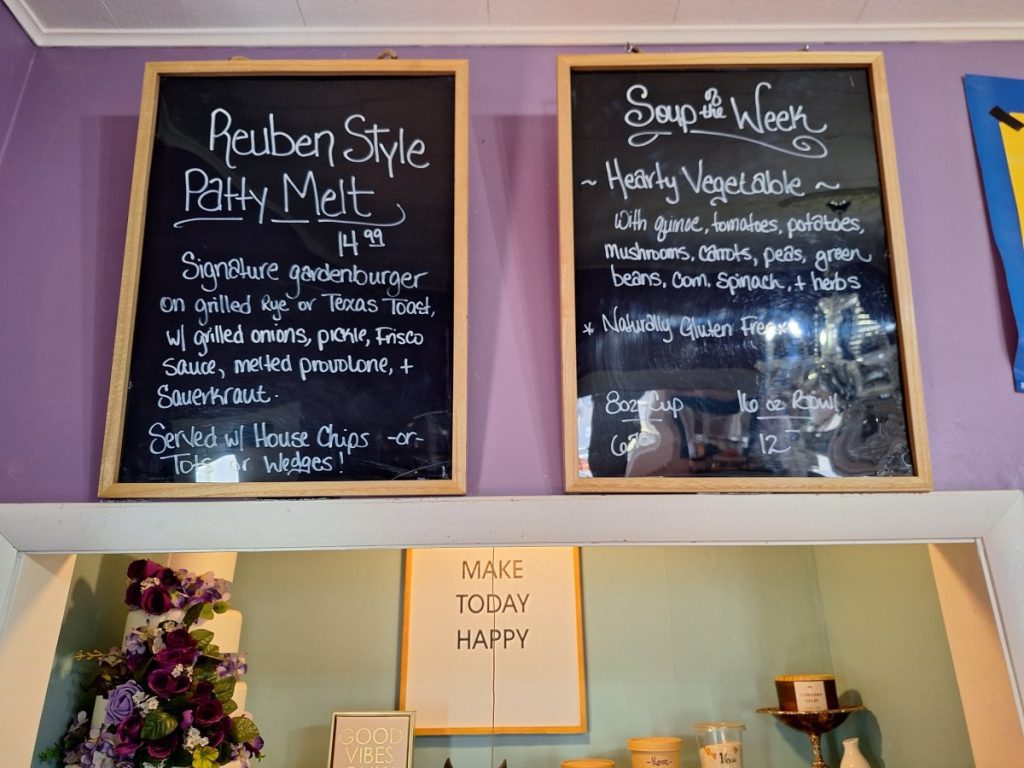


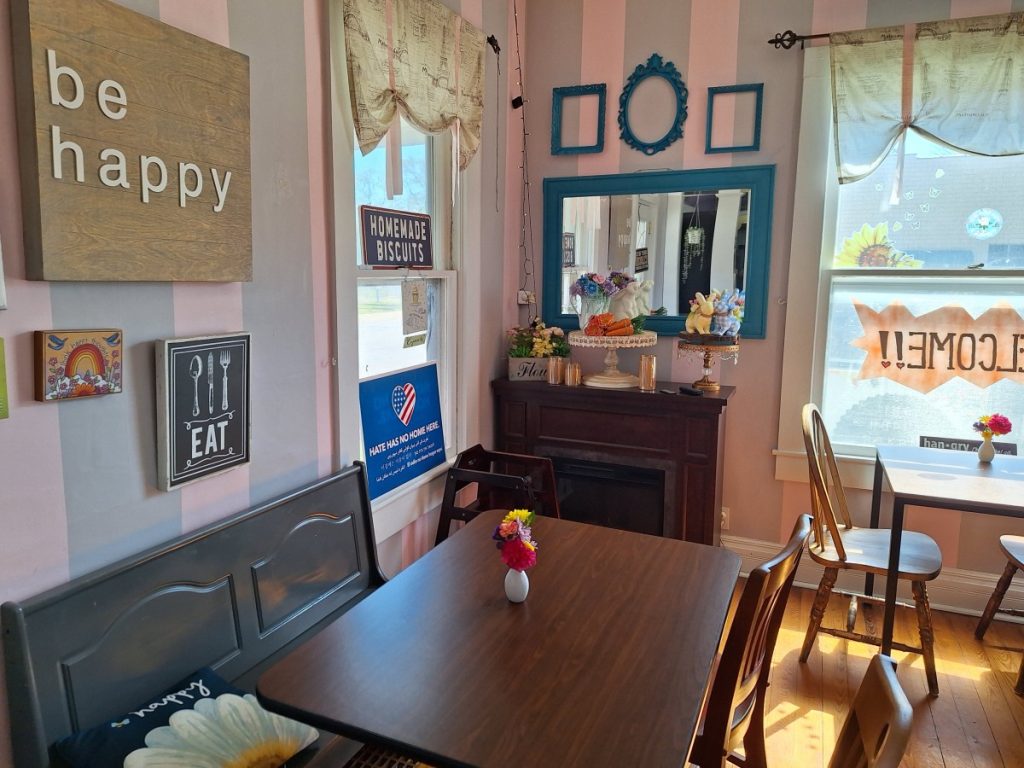
We’re Bruce and Karen Carlson. We recently moved to the Metro East area of Illinois. This area is east of St. Louis from the Mississippi River north to Alton, east to Carlyle, back south to Waterloo and the Mississippi River, finally north to Columbia. The center is Fairview Heights, Swansea, Belleville, Shiloh, and O'Fallon. Not to be forgotten is Southern Illinois University (SIU) in Edwardsville. It’s a whole new world out there. Our goal with this website is to share our exploration of the Metro East area. As we find businesses and services we use in our daily lives, we’ll share how these businesses and services have helped make our lives better and easier to live.
We’re calling our move to the Metro East area retirement, but we’re not quite sure what that means. By sharing our story with you, we hope you too will gain a better sense of what the Metro East area has to offer and how their businesses and services can improve your lives and build a better community.

